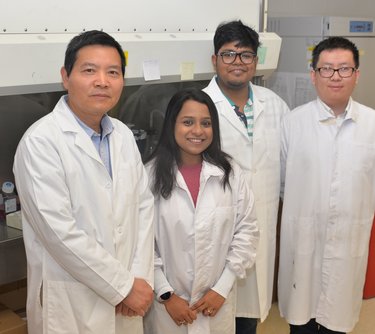Albany Med researchers get $3M NIH grant to develop plaque vaccine
— Photo from Albany Med
Scientists at Albany Medical College awarded a grant to research a vaccine to protect against plague are, from left, Wei Sun, Ph.D., associate professor in the Department of Immunology and Microbial Disease, and postdoctoral fellows, Shreya Das, Ph.D., Saugata Majumder, Ph.D. and Peng Li, Ph.D.
Albany Medical College scientists have been awarded a $3 million, five-year grant from the National Institutes of Health to develop a vaccine that could protect against plague.
A highly contagious disease caused by the bacteria Yersinia pestis, plague has killed millions of people throughout history. Bubonic plague is the most common naturally occurring form of the three main types of plague, which also include pneumonic plague and septicemic plague.
In the United States, plague is most common in rural areas of the southwest, particularly New Mexico, Arizona and Colorado.
For the most part, plague today is treated with antibiotics; there is no vaccine currently available that provides long-term defense against it.
“While plague in humans is relatively rare, we’ve begun to see strains that are resistant to antibiotics and there are concerns it could be used as a bioweapon,” said Wei Sun, Ph.D., associate professor in the Department of Immunology and Microbial Disease at Albany Medical College, who is leading the study, in a release from the college.
Sun and his team will attempt to modify another, less-lethal bacteria in the Yersinia family — Y. pseudotuberculosis — into a carrier for protective antigens against Yersinia pestis. After testing the protective immunity of this strain in animal models, they’ll work to decipher the mechanisms of the immune protection it induces.
“Our hope is that this project provides the fundamentals for the development of a highly effective and safe vaccine that can protect against current and future strains of plague,” said Sun.


